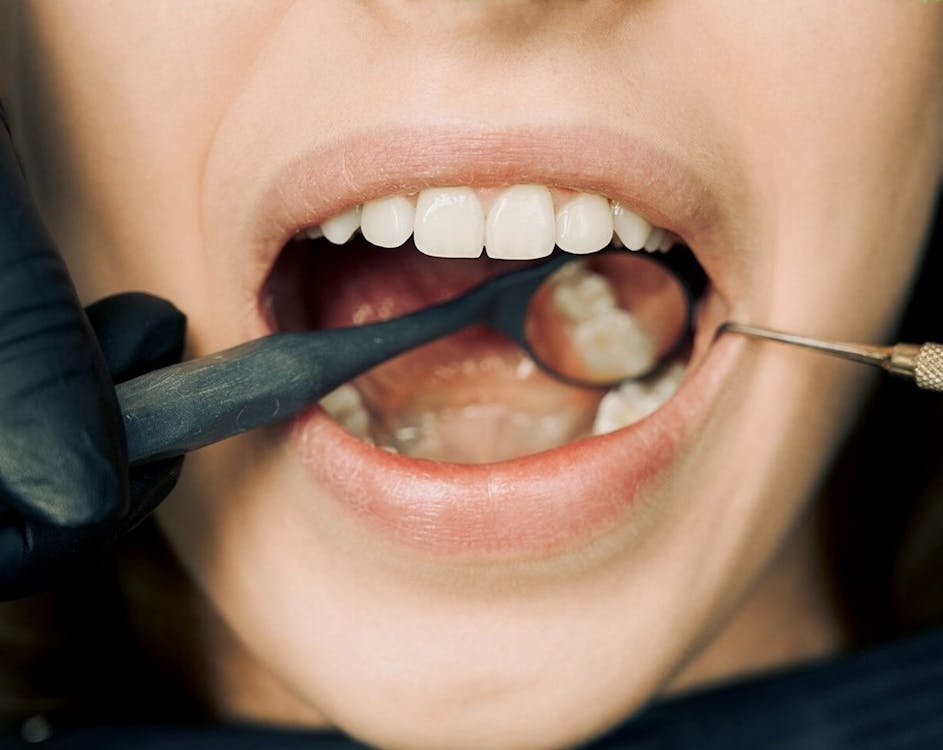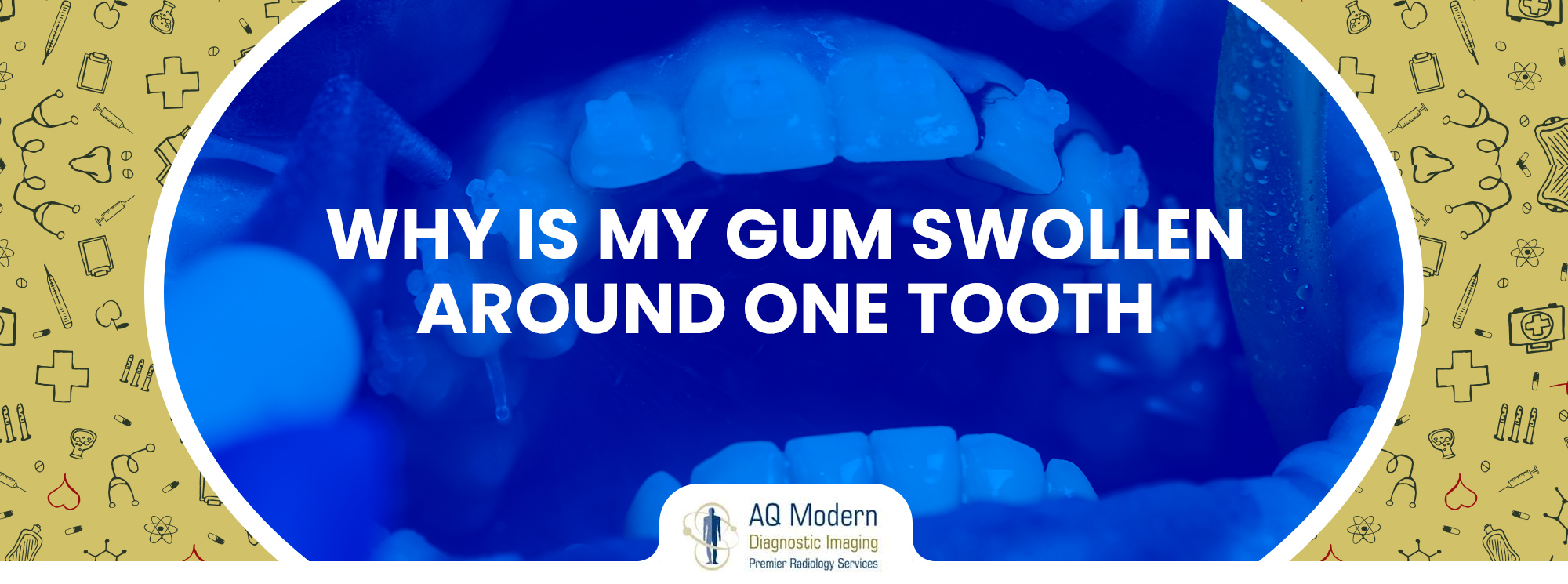Understanding Gum Inflammation and Treatment Options
A swollen gum around a single tooth can often cause concern. While it might seem like a minor issue, it’s essential to understand the underlying cause to ensure proper treatment. That is why we will try to answer the question in this comprehensive guide, Why is my gum swollen around one tooth? and explore treatment options depending on the cause. Furthermore, we will also shed light on home remedies to manage discomfort. So, let’s begin.
Why Do I Have Swelling In My Gum Only Around A Single Tooth?
There can be various reasons for gum inflammation around a specific tooth. The following are some of the most common culprits:
Food Impaction: Tiny food particles can become lodged between your teeth and gums, causing irritation and inflammation. This is a frequent cause, especially for teeth with uneven surfaces or poorly fitted crowns.
Gingivitis: It’s the preliminary stage of gum disease when a person has gum inflammation brought on by plaque accumulation. If left untreated, it can develop into periodontitis, a more serious gum infection that weakens the bone that supports your teeth.
Abscess: An abscess forms due to a bacterial infection. It is often filled with pus and can develop in the tooth pulp (periapical abscess) or within the gum tissue (periodontal abscess) around the tooth’s root. This condition is often accompanied by throbbing pain, fever, and bad breath.
Injury: Accidental trauma to the gum tissue from aggressive brushing or biting down on a hard object can cause puffy gums and swelling.
Why Do I Have a Swollen Gum in the Back?

Swollen gum around a tooth in the back of your mouth can arise from the same causes mentioned earlier. However, due to their location, these teeth might be more difficult to clean thoroughly, allowing them to gather impaction and plaque buildup easily. Additionally, it can be trickier to detect swelling in the back molars compared to the front teeth.
How to Treat Swollen Gums in the Back of Your Mouth
Treatment for swollen gums in the back depends on the underlying cause. Here’s a breakdown of potential approaches:
Food Impaction: Gently floss the area to remove the trapped food particles. If flossing proves difficult, rinse with a water flosser to dislodge the debris.
Gingivitis: Regular brushing and flossing are crucial for removing plaque buildup. Your dentist may recommend a professional cleaning (scaling and root planing) to remove hardened tartar and provide additional instructions on proper oral hygiene techniques.
Abscess: Dental abscesses require prompt medical attention. Antibiotics are helpful in fighting the infection, and depending on the severity, root canal therapy or tooth extraction might be necessary.
Injury: A mild injury will likely heal in a few days if you practice good oral hygiene. However, if the swelling continues or worsens, it is advisable to visit a dentist.
How to Cure Inflamed Gums
There’s no one-size-fits-all cure for gum swelling. The best solution depends on the reason for the inflammation. However, the following are some tips to promote gum health and alleviate swelling:
Practice thorough oral hygiene: Brush for a minimum of two minutes using fluoride toothpaste and a soft-bristled brush. Flossing is also essential to remove food fragments that may be lodged between your teeth.
Visit your dentist regularly: Make an appointment for dental checkups and expert cleanings at least twice a year. This allows your dentist to detect potential problems before they become complicated.
Consider a saltwater rinse: Doing a saltwater rinse once in a while can help reduce gum inflammation and discomfort. However, it cannot replace proper brushing and flossing.
Quit smoking: Smoking significantly hinders your body’s ability to fight infection and can worsen gum disease. Quitting smoking is crucial for maintaining overall oral health.
When to See a Dentist

While some home remedies can offer temporary relief from swollen gums, seeking professional dental care is crucial in certain situations. The following symptoms indicate a visit to your dentist has become necessary:
Persistent swelling: If the swelling persists for more than a few days, despite home care efforts, it indicates a need for professional evaluation.
Pain: Gum inflammation accompanied by throbbing pain, especially when biting down, suggests a potential abscess that requires prompt treatment.
Bleeding gums: While occasional bleeding during brushing is considered normal, persistent or excessive bleeding is a sign of gum disease and necessitates a dental checkup.
Fever: A fever alongside swollen gums could signal a widespread infection and require immediate medical attention.
Difficulty chewing: Pain or discomfort while chewing can be a result of various factors, including an abscessed tooth or advanced gum disease. Therefore, it is essential to make an appointment with your dentist to ascertain the underlying problem and the appropriate course of action.
Bad breath: Bad breath (halitosis) can be a symptom of gum disease or other underlying oral health issues. Consulting your dentist can help identify the cause and recommend solutions.
Preventing Swollen Gums
You may greatly lower your chance of getting swollen gums by making proper oral hygiene a priority and scheduling routine dental exams:
Brushing and Flossing: As mentioned earlier, regularly brushing and flossing can help build good oral hygiene. These practices remove plaque buildup, the primary culprit behind gum inflammation.
Healthy Diet: Essential nutrients are provided for healthy gums by a diet rich in fruits, vegetables, and whole grains and balanced. On the other hand, diets high in sugar and processed ingredients might contribute to the accumulation of plaque, raising the risk of gum disease.
Limit Smoking and Alcohol: More than usual consumption of alcohol and frequent smoking are significant risk factors for gum disease. Reducing alcohol use and giving up smoking are two major steps toward better dental health generally.
Manage Stress: Prolonged stress can impair immunity, reducing the body’s fight against infections and increasing the risk of gum disease.
Wrapping Up
In conclusion, swollen gums around a single tooth can signal various underlying issues. While you can easily address some causes, like food impaction, with proper flossing, others require professional dental intervention. It’s vital to identify the cause and seek timely intervention to ensure optimal oral health. If you are suffering from persistent gum inflammation, book an appointment with New Jersey Imaging Network Edison for a thorough evaluation and professional treatment.

